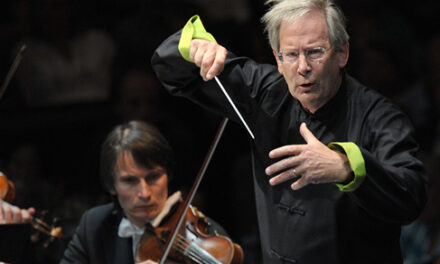Like critics of a certain age, Triangle music lovers who’ve been around a while know that Greg McCallum is one of our region’s very best pianists. It’s been a delight to chart his career from his earliest professional days in Orange County, where he made music and a fine reputation without the traditional anchor of an academic post. Over time, he’s espoused numerous beneficial causes, proposed and then executed – to varying degrees – several innovative and significant artistic projects, and consistently enriched his community and his listeners with superior and insightful keyboard artistry, both “live” and on a series of outstanding CDs. (His latest recording, Voyage à Paris, was recently reviewed by Karen Moorman in these pages.)
His concerts hereabouts have become less frequent in recent years, due – no doubt – to his heavy investment in preparation and research. Thus there was more than the usual buzz when a McCallum program was announced for Raleigh, which has not often been on his itinerary. And because his reputation preceded him, Meredith College’s Carswell Recital Hall was quite amply full on Sunday evening, January 17, on the eve of this year’s MLK, Jr., holiday.
The artist was, as they’d have said in a grand opera house, indisposed – he kept a bottle of water nearby and mopped his brow frequently. But he nonetheless managed most of an ambitious program that he titled “The Road to Messiaen.” He began with a powerful reading of Beethoven’s Piano Sonata No. 3, in C, Op. 2/3. It’s an early work, written when the composer was in his mid-20s and dedicated to Haydn. In McCallum’s hands, it seemed far more of the middle period, full of drama and dynamic contrasts that were only hinted at in the keyboard music of the dedicatee. The opening movement seemed a bit out of control and the scherzo was to these ears a tad too fast, causing some little articulation issues, but overall this was an awesome interpretation, and the player was warmly rewarded by the audience.
Chopin’s lovely Barcarolle in F-sharp, Op. 60, served to launch the big bicentennial year (it’s the 200th anniversary of the composer’s birth) in a big big way. McCallum introduced it amusingly, talking about the music’s depiction of falling in love in a boat; chances are no one who heard this explanation will ever think of this score in the same way again! The realization was splendid, and if it helped spark interest in all the future performances this year, so much the better.*
After the intermission, the second book of Debussy’s Images really did point the way to Messiaen. McCallum clearly felt these quasi-Oriental pieces deeply, and his solid technique facilitated his impressive realizations of the three numbers – “Cloches à travers les feuilles,” “Et la lune descend sur le temple qui fut,” and the ever-magical “Poissons d’or.” It may have astonished some in attendance that an American pianist could so convincingly bring this music to life, but McCallum has paid his dues – including spending time in France – and all who hear him are the fortunate beneficiaries.
At this point that Road to Messiaen encountered a block, due to illness and dwindling strength, so in lieu of the anticipated excerpt from Messiaen’s Vingt Regards sur l’Enfant-Jésus – the number that ends his recent CD – McCallum closed the program with one of Poulenc’s written-out Improvisations, specifically the one in A Minor that bears number 13. As it happens, this is the music that begins that new CD, and it was a more-than-fine conclusion for a splendid and enlightening evening with a superb artist.
When he’s regained his health, we’d all do well to have another program, ending with the Messiaen!
*Meredith’s Music Department offers its own Chopin Festival next month, with eight concerts and lectures and a competition packed into six busy days – see our calendar for details.











